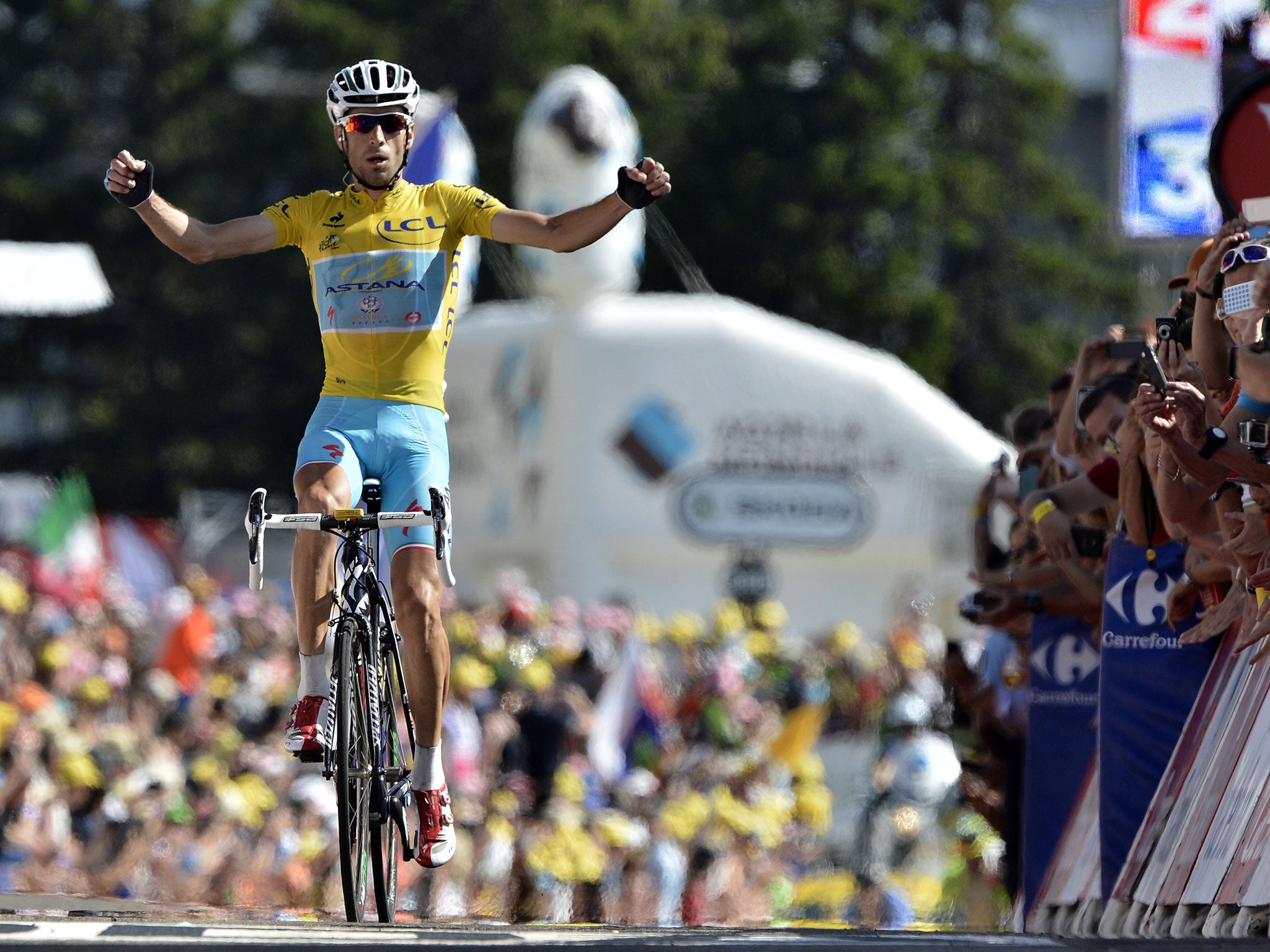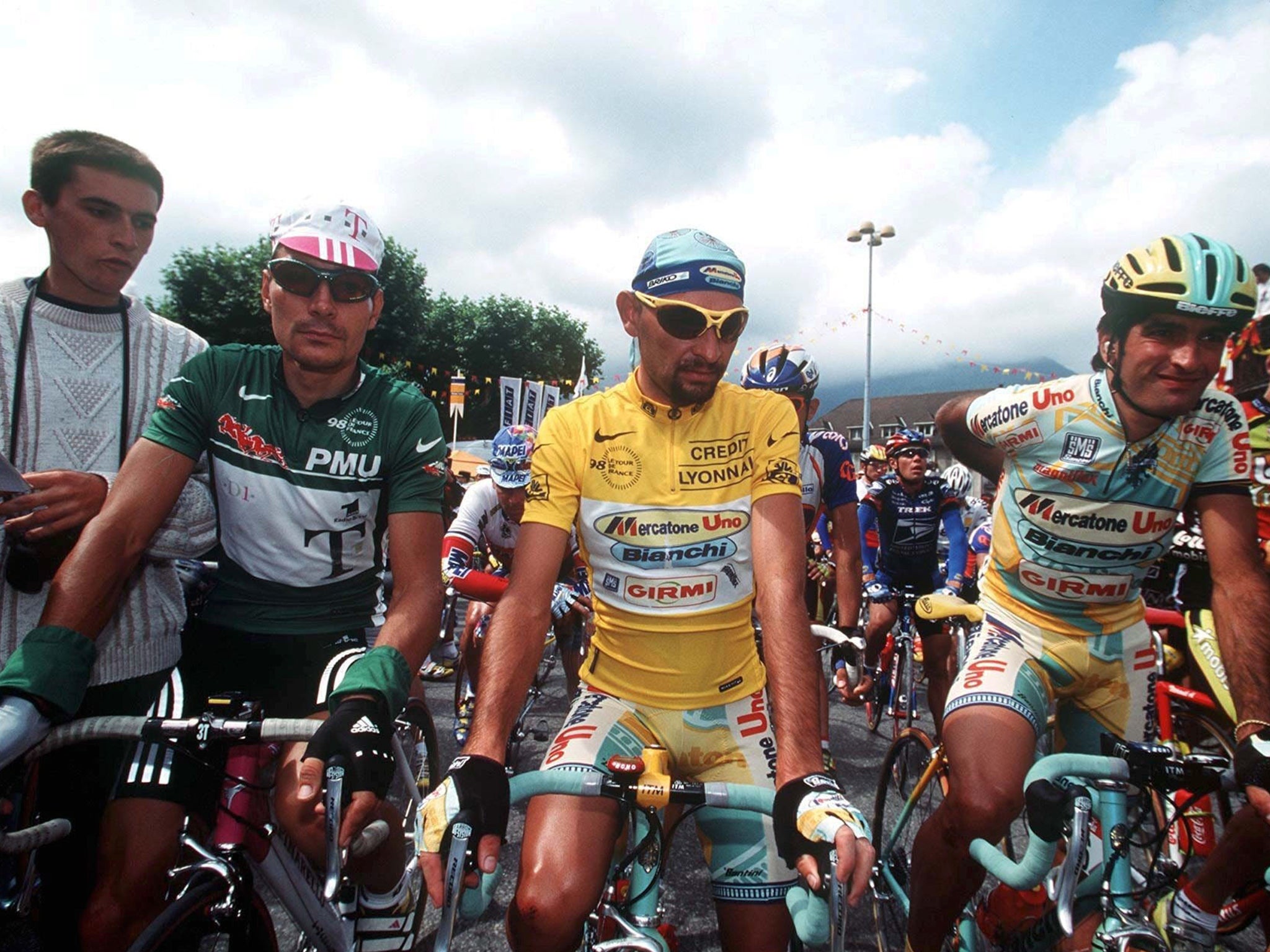Tour de France 2014: Vincenzo Nibali would provide a very different winner to the last Italian champion
Marco Pantani was the last Italian winner of the Tour back in 1998, and while a very different character to the leader of the current race, there are also similarities

Your support helps us to tell the story
From reproductive rights to climate change to Big Tech, The Independent is on the ground when the story is developing. Whether it's investigating the financials of Elon Musk's pro-Trump PAC or producing our latest documentary, 'The A Word', which shines a light on the American women fighting for reproductive rights, we know how important it is to parse out the facts from the messaging.
At such a critical moment in US history, we need reporters on the ground. Your donation allows us to keep sending journalists to speak to both sides of the story.
The Independent is trusted by Americans across the entire political spectrum. And unlike many other quality news outlets, we choose not to lock Americans out of our reporting and analysis with paywalls. We believe quality journalism should be available to everyone, paid for by those who can afford it.
Your support makes all the difference.One was a bandana-clad, earring-sporting icon with a rockstar’s lifestyle and the flamboyant personality to match, both on and off the bike.
The other has the kind of unflappable mien to survive a force-ten gale, yet pedals with impishness and devil.
Marco Pantani remains the last Italian to have won the Tour de France – the scandal-hammered 1998 edition. Now, sixteen years on Vincenzo Nibali appears poised to emulate Pantani’s achievement.
The contrasts are easy to draw. Pantani hailed from Rimini on Italy’s Adriatic Riviera – a town and region sprinkled liberally every summer with celebrity stardust; the home of a million bright party lights.
Nibali comes from Messina, the ankle of the oft-discarded boot that is Sicily. It’s a place as quiet and introverted as Rimini is proudly egotistical.
Is it too obvious to see traces of those places reflected in the characters of Nibali and Pantani? Perhaps. Yet at the same time it’s unavoidable.
Nibali is cool, calm, and collected to within a millimetre of his closely-cropped hair. In press conferences he exudes a subdued yet unmistakable confidence.
Pantani had more of the heavily-garlanded prize-fighter about him – an exoskeleton of hubris covering a deep and painful shyness that made him ultimately unsuited to the fame his exploits brought.

It’s on the bike that similarities emerge. Pantani won the 1998 Tour de France with as daring a display of attacking as the race has ever seen, escaping in gelid rain on the mighty Col du Galibier and riding solo to the finish atop Les Deux Alpes.
Nibali is imbued with that same relentlessly attacking spirit. His victory at the 2013 Giro d’Italia came as a result of a dominant solo ride to the top of the Tre Cime de Lavaredo, and this Tour de France has seen him forcing the pace even whilst in possession of his near-impregnable lead.
Watching the Sicilian descending again brings Pantani gloriously – and uncomfortably – to mind. Pantani took on downhills with his posterior perched precariously above his back wheel. Nibali crouches in between saddle and front wheel, forcing his already-slim frame into a concertina to shield himself from the wind.
The two share an unquenchable desire for daring on two wheels. Nibali’s Tour victory will fêted for the same reasons as Pantani’s was 16 years ago – for its brook-no-prisoners, front-foot bullishness.
There enlies a problem, of course – and another crucial difference between the Italian pair. Pantani’s jet-fuelled speed up the mountains of the 1998 Tour turned out to have been boosted by a more iniquitous booster – EPO, the drug of choice for cyclists in the 1990s that increased the oxygen-carrying capability of the blood.
The Pirate, as Pantani was nicknamed, ended his life in tragic chaos. He never truly recovered from his withdrawal from the 1999 Giro d’Italia due to a high haematocrit level – a race he was on the verge of winning in even more crushing fashion than he had the 1998 Tour.
Pantani died in a Rimini hotel room in Feburary 2004 from acute cocaine poisoning, having been exposed to too much of his birthplace’s infamous recreational drug scene.
Pantani’s sporting director during the years of his greatest triumphs was Giuseppe Martinelli – the same figure who now keeps watch over Nibali at Astana.
The lines of similarity between the two great Italian cyclists of their respective eras run deep but not symmetrically. Nibali is brilliant – as brilliant as Pantani ever was. But the Pirate too often carried the air of a tragic wraith, even in the midst of his most blinding victories.
Nibali trundles nothing more ominous than a quiet suitcase of solidity. It was revealing that in the interview following his stage win atop Chamrousse, he paid homage to Fabio Casartelli, the Italian killed in a high-speed crash on the descent of the Col de Portet d’Aspet on the 1995 Tour de France.
There was no mention of Pantani, the fallen rockstar. The Pirate was an icon cast adrift on a tumultuous sea. Nibali is ready to emulate him, whilst anchored securely on dry land.
Join our commenting forum
Join thought-provoking conversations, follow other Independent readers and see their replies
Comments